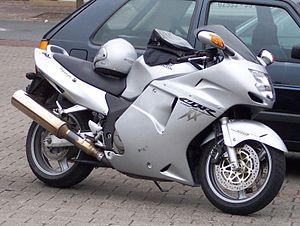 | |
| Manufacturer | Honda |
|---|---|
| Also called | Super Blackbird |
| Production | 1996–2007 |
| Predecessor | Honda CBR1000F |
| Class | Sport touring |
| Engine | 1,137 cc (69.4 cu in) liquid-cooled 4-stroke 16-valve DOHC inline-four |
| Bore / stroke | 79.0 mm × 58.0 mm (3.1 in × 2.3 in) |
| Compression ratio | 11.0:1 |
| Top speed | 1997: 188 mph (303 km/h) 1999: 188 mph (303 km/h), 186 mph (299 km/h), 188 mph (303 km/h) |
| Power | 164 hp (122 kW) @ 9,500 rpm 164 hp (122 kW) @ 9,750 rpm |
| Torque | 126 N⋅m (93 lbf⋅ft) @ 7,500 rpm 126 N⋅m (93 lbf⋅ft) @ 7,500 rpm |
| Ignition type | Computer-controlled digital with three-dimensional mapping |
| Transmission | Close-ratio 6-speed sequential manual Final drive: #530 O-ring sealed chain |
| Suspension | Front: 43 mm HMAS cartridge-type fork, 120 mm travel Rear: Pro-Link HMAS with gas-charged damper, rebound adjustable 120 mm travel |
| Brakes | Dual combined braking system Front: Three-piston caliper with dual 310 mm (12.2 in) discs Rear: Three-piston caliper with single 256 mm (10.1 in) disc |
| Tires | Front: 120/70 ZR17 Rear: 180/55 ZR17 |
| Rake, trail | 25°, 99 mm (3.9 in) |
| Wheelbase | 1,490 mm (58.7 in) |
| Dimensions | L: 2,160 mm (85.0 in) W: 720 mm (28.3 in) H: 1,170 mm (46.1 in) |
| Seat height | 810 mm (31.9 in) |
| Weight | 1997: 492 lb (223 kg) 1999: 496 lb (225 kg) (dry) 1997: 556 lb (252 kg) 1999 563 lb (255 kg) (wet) |
| Fuel capacity | 23.0 L (5.1 imp gal; 6.1 US gal) (including the 4 L reserve) |
| Fuel consumption | 39 mpg‑US (6.0 L/100 km; 47 mpg‑imp) |
| Related | Honda X11 |
The Honda CBR1100XX Super Blackbird is a Honda motorcycle, part of the CBR series made from 1996 to 2007. The bike was developed to challenge the Kawasaki Ninja ZX-11 as the world's fastest production motorcycle, and Honda succeeded with a top speed of 177 mph (285 km/h). Two years later the title passed to the Suzuki Hayabusa, which reached 193 mph (311 km/h). The Blackbird is named after the Lockheed SR-71, also a speed record holder.
It has the largest-displacement engine in Honda's CBR range of motorcycles.
Development
In the mid-1990s, Honda was determined to produce the world's fastest production motorcycle and to take over the associated bragging rights and marketing impact, at the time held by Kawasaki's Ninja ZX11. This led to the creation of the CBR1100XX Super Blackbird. The Blackbird name is a nod to the Lockheed SR-71 aircraft, the world's fastest production aircraft.
In the February 1997 issue of Sport Rider magazine, the CBR1100XX was tested at a top speed of 178.5 mph (287.3 km/h), compared with 175 mph (281.6 km/h) for the ZX-11. Its supremacy over the ZX-11 was confirmed in April 2007 by Motorcycle Consumer News, although the speeds achieved were slightly lower and the margin was narrower.
In 1999, the Suzuki Hayabusa overtook the CBR1100XX. It was listed in the 2000 Millennium Edition of Guinness World Records as the world's fastest production bike with a top speed of 194 mph (312 km/h) Hayabusa is the Japanese term for the Peregrine Falcon, a species of raptor which preys on blackbirds.
References
- ^ "Performance Index '10" (PDF), Motorcycle Consumer News, Bowtie Magazines, 2010, archived from the original (PDF) on 2010-02-15, retrieved 2011-02-14
- ^ "Motorcycle Performance Numbers: Honda". Sport Rider. February 1997. ISSN 1065-7649. Archived from the original on February 12, 2008.
- Smith, Don. "Honda CBR1100XX 1997-2003: speed king at one time, the biggest CBR drew fans for other reasons." Sport Rider Aug. 2010: 63+. General OneFile. Web. 14 June 2012.
- Brown, Roland (2006), The Ultimate History of Fast Motorcycles, Bath, UK: Parragon, pp. 214–215, ISBN 1-4054-7303-7
- ^ Coonan, Big Joe (April 1997). "Honda CBR1100XX vs. Kawasaki ZX-11". Motorcycle Consumer News. ISSN 1073-9408.
- ^ "Hard Numbers." Motorcyclist July 2000: 136. General OneFile. Web. 14 June 2012.
- Carrithers, Tim. "1997-2004 Honda CBR1100XX." Motorcyclist Dec. 2008: 98. General OneFile. Web. 14 June 2012.
- Coombs, Matthew (2007), Honda CBR1100xx Super Blackbird Service and Repair Manual, Sparkford, UK: Haynes, p. 0.10, ISBN 978-1-84425-752-2
- ^ Brown, Roland (2005), The Ultimate History of Fast Motorcycles, Bath, UK: Parragon, pp. 216–217, 242–243, ISBN 1-4054-5466-0
- Terri, Sievert (2002), The World's Fastest Superbikes; Built for speed, Capstone Press, ISBN 9780736810609
- ^ Guinness World Records 2000 Millennium Edition. Guinness World Records Ltd. 1999. p. 179. ISBN 0-85112-098-9.
- Hoyer, Mark (June 2007), "'Busas, Baby! Looking Back at Suzuki's Steamroller of Speed", Cycle World, Newport Beach, California: Hachette Filipacchi Media U.S., ISSN 0011-4286, archived from the original on 2007-08-22
- ^ "Archived copy". Archived from the original on 2011-06-07. Retrieved 2008-05-25.
{{cite web}}: CS1 maint: archived copy as title (link) - "Motorcycle Performance Numbers:Kawasaki". Sport Rider. February 1997. ISSN 1065-7649. Archived from the original on February 12, 2008.
| Records | ||
|---|---|---|
| Preceded byKawasaki Ninja ZX-11 | Fastest production motorcycle 1996–1999 |
Succeeded bySuzuki Hayabusa |
| « previous - Honda motorcycle timeline, 1990s (street) - next » | |
|---|---|
| Honda Motor Company | |||||||||||||||
|---|---|---|---|---|---|---|---|---|---|---|---|---|---|---|---|
| Divisions and subsidiaries | |||||||||||||||
| Joint ventures and shareholdings |
| ||||||||||||||
| Automobiles |
| ||||||||||||||
| Concept | |||||||||||||||
| Bikes |
| ||||||||||||||
| Engines |
| ||||||||||||||
| Robots | |||||||||||||||
| People | |||||||||||||||
| Other | |||||||||||||||